Items
Search full-text
Focus On Ability Film Festival
- Carl Emmerson
- Bridie McKim
- Blaise Borrer
- Bailey Richards
- Ashleigh Smart
- Alex Sideratos
- Sarah Boulton
- Michael Whelan
- Katherine Dionysius
-
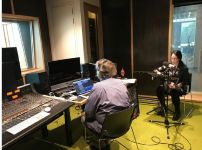 "Janice Rieger, Bree Hadley, Katherine Dionysius, Michael Whelan (2019) VIS-ABILITY: Audio Description of Denise Green's 'Saar elegy: Opposites' 2014." "This is an audio description of Denise Green’s artwork, ‘Saar elegy: opposites’ (2014) narrated by Dr Bree Hadley. This recording was produced in partnership with QUT Creative Industries Faculty for the exhibition, 'Vis-ability' at QUT Art Museum, from 11 May to 4 August 2019."
"Janice Rieger, Bree Hadley, Katherine Dionysius, Michael Whelan (2019) VIS-ABILITY: Audio Description of Denise Green's 'Saar elegy: Opposites' 2014." "This is an audio description of Denise Green’s artwork, ‘Saar elegy: opposites’ (2014) narrated by Dr Bree Hadley. This recording was produced in partnership with QUT Creative Industries Faculty for the exhibition, 'Vis-ability' at QUT Art Museum, from 11 May to 4 August 2019." -
 "Janice Rieger, Bree Hadley, Katherine Dionysius, Michael Whelan (2019) VIS-ABILITY: Audio Description of Karla Marchesis' artwork, 'Trashout' (2010)." "This is an audio description of Karla Marchesi's painting, 'Trashout' (2010), narrated by Dr Bree Hadley and recorded by Michael Whelan. This recording was produced in partnership with QUT Creative Industries Faculty for the exhibition, 'Vis-ability' at QUT Art Museum, from 11 May to 4 August 2019."
"Janice Rieger, Bree Hadley, Katherine Dionysius, Michael Whelan (2019) VIS-ABILITY: Audio Description of Karla Marchesis' artwork, 'Trashout' (2010)." "This is an audio description of Karla Marchesi's painting, 'Trashout' (2010), narrated by Dr Bree Hadley and recorded by Michael Whelan. This recording was produced in partnership with QUT Creative Industries Faculty for the exhibition, 'Vis-ability' at QUT Art Museum, from 11 May to 4 August 2019." -
 "Janice Rieger, Bree Hadley, Katherine Dionysius, Michael Whelan, Megan Strickfaden(2019) VIS-ABILITY: Audio Description of Karla Dicken's artworks, 'Bottom feeder I-IV' (2018)." "This is an audio description of Karla Dickens' artworks, 'Bottom feeder I-IV' (2018), narrated by Dr Bree Hadley and recorded by Michael Whelan. This recording was produced in partnership with QUT Creative Industries Faculty for the exhibition, 'Vis-ability' at QUT Art Museum, from 11 May to 4 August 2019."
"Janice Rieger, Bree Hadley, Katherine Dionysius, Michael Whelan, Megan Strickfaden(2019) VIS-ABILITY: Audio Description of Karla Dicken's artworks, 'Bottom feeder I-IV' (2018)." "This is an audio description of Karla Dickens' artworks, 'Bottom feeder I-IV' (2018), narrated by Dr Bree Hadley and recorded by Michael Whelan. This recording was produced in partnership with QUT Creative Industries Faculty for the exhibition, 'Vis-ability' at QUT Art Museum, from 11 May to 4 August 2019." -
 "Janice Rieger, Bree Hadley, Katherine Dionysius, Michael Whelan (2019) VIS-ABILITY: Audio Description of Brown, Green and Cattapan's 'War and peace #7: Empire' (2011)." "This is an audio description of Lyndell Brown, Charles Green and Jon Cattapan's artwork 'War and peace #7: Empire', narrated by Dr Bree Hadley and recorded by Michael Whelan. This recording was produced in partnership with QUT Creative Industries Faculty for the exhibition, 'Vis-ability' at QUT Art Museum, from 11 May to 4 August 2019."
"Janice Rieger, Bree Hadley, Katherine Dionysius, Michael Whelan (2019) VIS-ABILITY: Audio Description of Brown, Green and Cattapan's 'War and peace #7: Empire' (2011)." "This is an audio description of Lyndell Brown, Charles Green and Jon Cattapan's artwork 'War and peace #7: Empire', narrated by Dr Bree Hadley and recorded by Michael Whelan. This recording was produced in partnership with QUT Creative Industries Faculty for the exhibition, 'Vis-ability' at QUT Art Museum, from 11 May to 4 August 2019." -
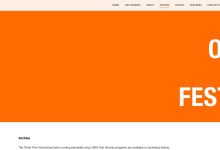 The Other Film Festival - Past Festivals, captured 2022" "The Other Film Festival - Past Festivals, captured 2022, includings programs 2004 to 2022
The Other Film Festival - Past Festivals, captured 2022" "The Other Film Festival - Past Festivals, captured 2022, includings programs 2004 to 2022 - Accessible Arts
-
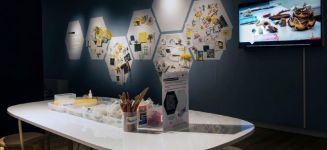 "Janice Rieger, Jasmien Herssens, Megan Strickfaden, Marianella Chamorro-Koc, Bree Hadley (2019) Vis-ability Exhibition." "The United Nations Convention on the Rights of Persons with Disabilities (UNCRPD, 2016) foregrounds the importance of cultural participation to realise human rights for people with disabilities. The creative industries play a critical role in supporting and shaping these social attitudes towards inclusion. Through the theoretical foundation of Design for All (EIDD Stockholm Declaration, 2004) new engagement processes involving a transdisciplinary team from Australia and around the world converged at QUT to co-design more equitable and collaborative forms of knowledge and practice around inclusion. International universities, the EU Commission and the European Institute for Design & Disability collaborated and presented Design for All for the first time in Australia, positioning QUT leadership in this field and as the first non-European member of EIDD-DfA. Co-design methods were employed through, Vis-ability workshops, Making Visible workshops, tactile artefacts and audio description work in the VisAbility Exhibition. Innovative practice was through the Inclusive Film Screening and Wondrous Googles technologies. An innovative model of engagement was created through the DfA Week program and events across sectors. Knowledge was disseminated through academic articles."
"Janice Rieger, Jasmien Herssens, Megan Strickfaden, Marianella Chamorro-Koc, Bree Hadley (2019) Vis-ability Exhibition." "The United Nations Convention on the Rights of Persons with Disabilities (UNCRPD, 2016) foregrounds the importance of cultural participation to realise human rights for people with disabilities. The creative industries play a critical role in supporting and shaping these social attitudes towards inclusion. Through the theoretical foundation of Design for All (EIDD Stockholm Declaration, 2004) new engagement processes involving a transdisciplinary team from Australia and around the world converged at QUT to co-design more equitable and collaborative forms of knowledge and practice around inclusion. International universities, the EU Commission and the European Institute for Design & Disability collaborated and presented Design for All for the first time in Australia, positioning QUT leadership in this field and as the first non-European member of EIDD-DfA. Co-design methods were employed through, Vis-ability workshops, Making Visible workshops, tactile artefacts and audio description work in the VisAbility Exhibition. Innovative practice was through the Inclusive Film Screening and Wondrous Googles technologies. An innovative model of engagement was created through the DfA Week program and events across sectors. Knowledge was disseminated through academic articles." - Megan Strickfaden
- Film Australia
- Madeleine Little
-
"Janice Rieger and Megan Strickfaden(2019) “Dis/ordered assemblages of disability in museums.” In The Routledge Handbook of Disability Art, Culture, and Media, edited by Bree Hadley and Donna McDonald, 48–61. London & New York: Routledge." "Museums are spaces of power and care. They are institutions that present assemblages (Deleuze & Guattari 2002), which are reconstructions and representations of history and societal values, and thus are partial realities that curate human existence. These assemblages cannot ever represent the totality of human existence because it is never possible to do so, and yet these assemblages are embedded with power because choices are made about what ought or ought not be represented within museums (Ott 2013; Bennet 2017). The nature of partial realities is that, at their centre, these are still representations that tell stories of what one would imagine to be the most significant events related to a place (nation, city), with a particular focus on a societal event or issue (war, art, sports, nature, human rights, etc.) and peoples (e.g. immigrants, migrants, First Nations or Indigenous peoples, etc.). Persons attending museums rely on the expertise of historians, curators, archivists, conservators, and exhibition designers to present materials within the museum that focus upon and represent societal values. Most museum visitors are not aware of the power that museums hold, although more and more museum visitors push against narratives which they do not feel to be adequate representations of the places, events, issues, and peoples of society (Hooper-Greenhill 1992, 2000; Anderson 2004; Janes 2009, 2010). Where there is power, there is also care. Historians, curators, archivists, conservators, and exhibition designers take great care in how they assemble materials within museums."
-
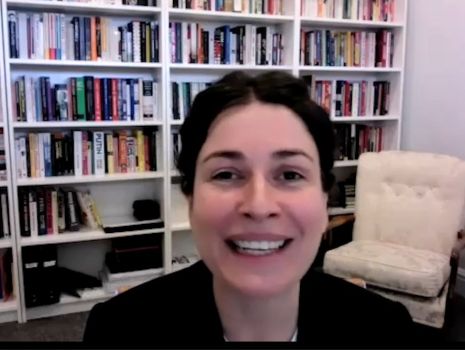 "Interview with Astrid Edwards" Astrid Edwards is a writer, publisher, lecturer, podcast host and disability advocate. Interview Summary Astrid Edwards, a former teacher and policy consultant, discusses in the interview how she pivoted her career towards writing and literature after being diagnosed with multiple sclerosis at 32, inspiring her to focus on work she loves. Astrid talks about writing at RMIT University, working with a diverse cohort of students, (many of whom have disabilities or are writing about trauma), which she finds rewarding. Though her work includes advocacy roles and a focus on disability, she does not wish to be defined solely by her illness, emphasizing the importance of allowing disabled individuals the freedom to explore and create beyond their disabilities. Currently, Astrid says she is a judge for the Stella Prize and discusses exploring a potential PhD about publishing and climate fiction, expressing a passion for addressing climate change within her work.
"Interview with Astrid Edwards" Astrid Edwards is a writer, publisher, lecturer, podcast host and disability advocate. Interview Summary Astrid Edwards, a former teacher and policy consultant, discusses in the interview how she pivoted her career towards writing and literature after being diagnosed with multiple sclerosis at 32, inspiring her to focus on work she loves. Astrid talks about writing at RMIT University, working with a diverse cohort of students, (many of whom have disabilities or are writing about trauma), which she finds rewarding. Though her work includes advocacy roles and a focus on disability, she does not wish to be defined solely by her illness, emphasizing the importance of allowing disabled individuals the freedom to explore and create beyond their disabilities. Currently, Astrid says she is a judge for the Stella Prize and discusses exploring a potential PhD about publishing and climate fiction, expressing a passion for addressing climate change within her work. -
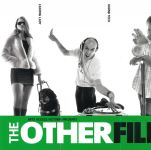 "The Other Film Festival Program 2004" The Other Film Festival Program 2004 - Australian work screened includes CALLAHAN: HE WON'T GET FAR ON FOOT D: Liz O'dea Documentary, 26 Min, Aust, 2001; D-TUNE: MOTIF 1 D: Katherine Chinnick & Tony Nirta, Animation, 5 Min, Aust, 2004; PART ANIMAL, PART MACHINE D: Warren Macdonald, Documentary, 20 Min, Aust, 2003; THE WORLD REALLY IS W… D: Kim Miles, Experimental, 6 Min, Aust, 2003; THE COMPANY YOU KEEP D: Lucy Paplinska, Documentary, 28 Min, Aust, 2003; UNTOLD DESIRES D: Sarah Barton, Documentary, 52 Min, Aust, 1994; BIRD from Art Day South Program, Fiction, 6 Min, Aust, 2001. Australian work screend in the ‘The Other Program’, described as “Screening films by Australia’s new, emerging and independent filmmakers and featuring Q&A sessions,” Australian work screened includes THE ABILITY TREK from Guiness Entertainment, 8TH OF MAY from Winfred Kwan Weng Fook, JAM from Lee Galea, WHEEL LOVE from Emma Butler, THE DANCE from Bee Williamson, THEATRE OF HOPE from City of Port Phillip, 12 WAYS TO OPEN A DOOR from Theatre of Speed/ Back to Back Theatre, A DAY IN THE LIFE from No Strings Attached, EXIT Q from Phil Heuzenroeder, THE JOB from David King, IN THEORY from Remo Camerot, THE TOY TUB from Telen Rodwell, THE GOODLOOKING FILM from Art Day South, STAR STREET from The Geelong Arts Alliance, FUTURE FILMS from Yum Productions, BLACK DANCE and MILES TO GO from Tony Sarre, THROUGH MY EYES from Lisa Warne, EACH NEW MORNING from Alycia Johnston, TEAMHANDCYCLE, A FISTFUL OF HEART, and SIZE 9(RIGHT) from Bernzerk Productions.
"The Other Film Festival Program 2004" The Other Film Festival Program 2004 - Australian work screened includes CALLAHAN: HE WON'T GET FAR ON FOOT D: Liz O'dea Documentary, 26 Min, Aust, 2001; D-TUNE: MOTIF 1 D: Katherine Chinnick & Tony Nirta, Animation, 5 Min, Aust, 2004; PART ANIMAL, PART MACHINE D: Warren Macdonald, Documentary, 20 Min, Aust, 2003; THE WORLD REALLY IS W… D: Kim Miles, Experimental, 6 Min, Aust, 2003; THE COMPANY YOU KEEP D: Lucy Paplinska, Documentary, 28 Min, Aust, 2003; UNTOLD DESIRES D: Sarah Barton, Documentary, 52 Min, Aust, 1994; BIRD from Art Day South Program, Fiction, 6 Min, Aust, 2001. Australian work screend in the ‘The Other Program’, described as “Screening films by Australia’s new, emerging and independent filmmakers and featuring Q&A sessions,” Australian work screened includes THE ABILITY TREK from Guiness Entertainment, 8TH OF MAY from Winfred Kwan Weng Fook, JAM from Lee Galea, WHEEL LOVE from Emma Butler, THE DANCE from Bee Williamson, THEATRE OF HOPE from City of Port Phillip, 12 WAYS TO OPEN A DOOR from Theatre of Speed/ Back to Back Theatre, A DAY IN THE LIFE from No Strings Attached, EXIT Q from Phil Heuzenroeder, THE JOB from David King, IN THEORY from Remo Camerot, THE TOY TUB from Telen Rodwell, THE GOODLOOKING FILM from Art Day South, STAR STREET from The Geelong Arts Alliance, FUTURE FILMS from Yum Productions, BLACK DANCE and MILES TO GO from Tony Sarre, THROUGH MY EYES from Lisa Warne, EACH NEW MORNING from Alycia Johnston, TEAMHANDCYCLE, A FISTFUL OF HEART, and SIZE 9(RIGHT) from Bernzerk Productions. -
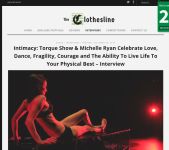 "The Clothesline - Intimacy: Torque Show & Michelle Ryan Celebrate Love, Dance, Fragility, Courage and The Ability To Live Life To Your Physical Best – Interview" The Clothesline (2015) 'Intimacy: Torque Show & Michelle Ryan Celebrate Love, Dance, Fragility, Courage and The Ability To Live Life To Your Physical Best – Interview'
"The Clothesline - Intimacy: Torque Show & Michelle Ryan Celebrate Love, Dance, Fragility, Courage and The Ability To Live Life To Your Physical Best – Interview" The Clothesline (2015) 'Intimacy: Torque Show & Michelle Ryan Celebrate Love, Dance, Fragility, Courage and The Ability To Live Life To Your Physical Best – Interview' -
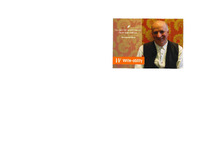 "Writers Victoria profile postcards of Write-ability Fellows - Giovanni di Mase" Writers Victoria profile postcards of Write-ability Fellow Giovanni di Mase
"Writers Victoria profile postcards of Write-ability Fellows - Giovanni di Mase" Writers Victoria profile postcards of Write-ability Fellow Giovanni di Mase -
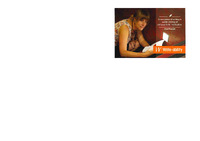 "Writers Victoria profile postcards of Write-ability Fellows - Heidi Everett" Writers Victoria profile postcards of Write-ability Fellow Heidi Everett
"Writers Victoria profile postcards of Write-ability Fellows - Heidi Everett" Writers Victoria profile postcards of Write-ability Fellow Heidi Everett
